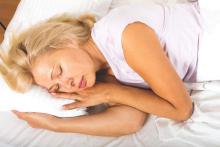NATIONAL HARBOR, MD – While Americans search high and low for solutions to their chronic pain problems, one of the simplest fixes may be right under their noses: getting a good night’s sleep.
Dr. Ashwin Mehta of the University of Miami spoke at length about the need for deep, restful sleep, and the relationship between circadian rhythms and chronic lower back pain, during a presentation at the annual meeting of the American Academy of Pain Medicine.
“REM [rapid eye movement] sleep [can] optimize regulation of physiological functions,” explained Dr. Mehta, adding that sleep loss can lead to altered immune responses, changes in circulating levels of leukocytes and cytokines, and decreased levels of antibodies.
Citing earlier research by another investigator, Dr. Mehta explained that there is evidence pain is directly correlated to fatigue, with sleep holding the key to solving problems with both (J Pain Symptom Manage. 2010 Jan;39[1]:126-38). Particularly in cancer patients, restfulness was shown to improve mood and well-being in a similar study (J Clin Oncol. 2012 Mar 19;30[12]:1335-42).
Dr. Mehta also reviewed known information that neuropeptides, specifically, serotonin, glutamate, gama-aminobutyric acid, and substance P, are linked to poor sleep, poor mood, and chronic pain. Multidisciplinary approaches should be considered by physicians and patients to find the most effective strategy for getting good sleep and mitigating chronic pain. These approaches can include, among other things, cognitive-behavioral interventions, increased exercise, breathing exercises, and yoga (Sleep. 2011 Dec 1;34[12]:1631-40).
Magnesium, vitamin D, and products with lavender (Am J Crit Care. 2014 Jan;23[1]:24-9) and passionflower (Phytother Res. 2011 Aug;25[8]:1153-9) – such as oil and tea – can help with achieving restful sleep on a consistent basis, and have been studied as recently as 2014 and 2011, respectively, said Dr. Mehta.
Naps can also be effective, although impractical for most patients. Finding time either in the middle of the day or after work for a nap can help improve sleep at night, while walking a mile after dinner is also highly recommended. Good “sleep hygiene” is also encouraged; this includes sleeping someplace that is both quiet and dark, without any bright lights – this includes the omnipresent cell phones, laptops, tablet computers, and televisions. Patients should also never eat while in bed, and refrain from alcohol and caffeine before going to bed.
Dr. Mehta did not report any relevant financial disclosures.


